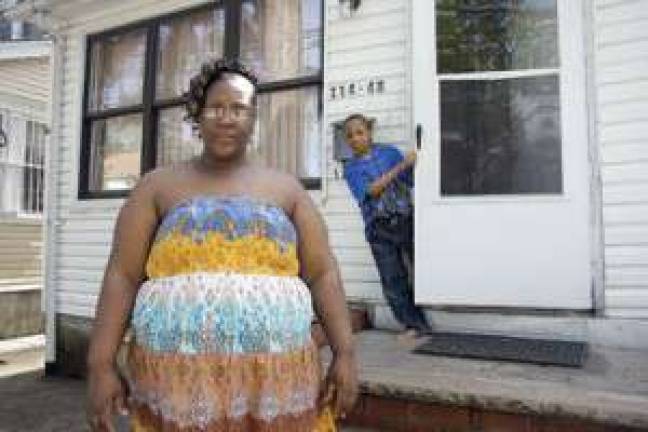Raising the State Minimum Wage: How Much Can $1.25 Change Someone's Life?

City & State's in-depth look at raising the New York State minimum wage Five days a week Michelle Dawkins wakes up at 2:30 a.m. and drives from her Bronx apartment to begin her shift at JFK Airport, ferrying wheelchair-bound passengers among the airport's eight terminals. From 4:30 a.m. to 12:30 p.m., Dawkins-whom her co-workers affectionately call "Mother Love"-will make $7.25 an hour, or $58 for the day. If Dawkins, 42, doesn't require an unpaid sick day, and if the airport needs her for 40 hours each week-which is not always a certainty during the lean fall and winter travel season-she will make $15,080 over the course of a year. Under a new proposal currently being debated in Albany, Dawkins and the 91,000 other New Yorkers who make the federal minimum wage will see that hourly wage increase by $1.25. Five more quarters an hour will not be enough to lift Michelle Dawkins out of poverty, take her off food stamps or get her away from Medicaid, but she said it would make a difference. In 2002 she made $13 an hour as a security screener, but she left the job to take care of her mother, who died of breast cancer two years later. In 2005 she made $11 an hour doing the same job she has now, but for a different company. "I say any bit, even if it's a quarter more, you're gonna turn around and see a difference," she said. "If it went to 10, it would make a world of difference." "We could go to restaurants, we could go to movies, we could get an accountant," she joked. Minimum-wage jobs are the fastest-growing sector of the state's economy, and the number of workers making $7.25 an hour jumped dramatically from 6,000 in 2008 to 91,000 by 2011. But whether Dawkins receives the extra $1.25 per hour, which will cost her employer an additional $2,900 a year, will have very little to do with how badly she wants or needs it-or even with what economists, business owners and voters say they want-and everything to do with politics in Albany. Assembly Speaker Sheldon Silver has staked his legislative session on a policy move with a long history of winning seats for Democrats in tight elections. Senate Republicans won't touch anything branded job-killing with a ten-foot pole unless they get something in return. And Gov. Andrew Cuomo is not actively championing the bill, a move seemingly designed to keep all the sides playing against one another while he maintains his position as the ultimate referee. When Speaker Silver introduced Gov. Cuomo before his State of the State Address in January, he used the occasion to announce he would seek an increase in the minimum wage as his major legislative priority for the year. Cuomo later said he was in favor of the increase. The timing of Silver's proposal was auspicious-minimum wage is an issue that Democrats use to win campaigns. The proposed minimum-wage hike has the broadest approval of any legislative measure in recent history, with 79 percent of statewide voters and 61 percent of Republicans in favor of an increase. In an election year in which Republicans in the Senate must hold onto their tenuous majority, Democrats have effectively dared Republicans to let November roll around without voting "Yes" on an issue that has overwhelming popular support. "Given the state of the economy and the broad-based popularity of the issue, the increase in the minimum wage is something that could affect any race in the state," said Sen. Mike Gianaris, chairman of the Senate Democratic Campaign Committee. "My preference is to have Senate Republicans follow their typical pattern and buckle to our agenda to avoid a political problem," he joked darkly. If Republicans didn't pass it, then Democrats will make the November elections into a referendum on minimum wage, he said. Dan Cantor, the executive director of the Working Families Party, said advocates are trying to urge individual Republican senators to convince Sen. Majority Leader Dean Skelos to bring the bill to the floor for a vote. "We have to convince Republican senators that this is economically, politically and morally smart," he said, adding, "If they don't pass it, then that's why we have elections." So far, Senate Republicans seem content to take their chances. Skelos has routinely referred to any increase as a "job killer," and last week the Republicans defeated Democrats' efforts to attach a minimum-wage amendment to a tax-cut bill. In the months after Silver announced the proposed wage hike, lobbyists and economists opposed to the bill mobilized to amplify Skelos' argument. The Business Council of New York State, which shares members with the Committee to Save New York, the group that spent $22 million lobbying on behalf of Cuomo's budget this year and last year, released a statement calling the proposed wage hike "unconscionable," arguing it would result in "lost jobs and a reduction in training opportunities for low-income employees." Opponents like Nicole Gelinas, a policy analyst for the conservative Manhattan Institute and the Business Council, cite a 2008 economics paper coauthored by economists from Cornell and American University that tied increases in the state's minimum wage to lost jobs for poor and lower-skilled workers. "It could cost 29,000 jobs, and only 20 percent of the benefits would go to workers working in poor households," Gelinas said. According to Gelinas, a follow-up study by the same economists issued in January demonstrates that "the biggest effect is on lower-skilled workers and younger workers. If you raise the minimum wage, it does hit a lot of the smaller businesses. They decide 'We'll do more of this work ourselves.' " To read the full article at City & State [click here](http://www.cityandstateny.com/1-25-change-someones-life-2/).